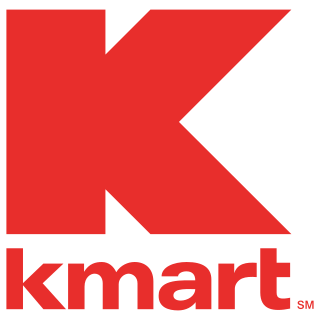Related Research Articles

Kmart Corporation, is an American big box department store chain headquartered in Hoffman Estates, Illinois, United States. The company was incorporated in 1899 as S. S. Kresge Corporation and renamed Kmart Corporation in 1977. The first store with the Kmart name opened in 1962. At its peak in 1994, Kmart operated 2,486 stores globally, including 2,323 discount stores and Super Kmart Center locations in the United States. From 2005 through 2019, Kmart was a subsidiary of Sears Holdings Corporation and is now a subsidiary of Transform SR Brands LLC.

Farmer Jack was a supermarket chain based in Detroit, Michigan. At its peak, it operated more than 100 stores, primarily in metropolitan Detroit. In its final years, the chain operated as the Midwest subsidiary of the New Jersey-based A&P Corporation. A&P closed the Farmer Jack chain on July 7, 2007.
Jacobson's was an American regional department store chain. Based in Jackson, Michigan, the chain operated primarily in Michigan and Florida, but also had stores in Ohio, Indiana, Kentucky and Kansas. Jacobson's focused on apparel, fine jewelry and home furnishings. The chain entered bankruptcy in early 2002 after 164 years of service. One store in Winter Park, Florida was re-established as Jacobson's in 2004, but closed on December 21, 2011.
SpartanNash is an American food distributor and grocery store retailer headquartered in Byron Center, Michigan. The company's core businesses include distributing food to independent grocers, military commissaries, and corporate-owned retail stores in 44 states, Europe, Latin America, and the Middle East. SpartanNash operates 142 corporate-owned retail stores under a number of brands located in North Dakota, South Dakota, Nebraska, Minnesota, Iowa, Indiana, Wisconsin, Michigan, and Ohio, many of which were local grocery chains acquired by SpartanNash. In terms of revenue, it is the largest food distributor serving military commissaries and exchanges in the United States. It is known for its Our Family line of products and formally the "Spartan" line of products.

Great Lakes Crossing Outlets, formerly Great Lakes Crossing, is an enclosed shopping mall in the city of Auburn Hills, Michigan, a northern suburb of Detroit, Michigan, United States. The site of the mall was originally to have been occupied by a different mall called Auburn Mills, which was never built due to financial issues of its intended developer, Western Development Corporation. Great Lakes Crossing was built on the site and opened in 1998. Constructed and owned by Taubman Centers, Great Lakes Crossing Outlets is the largest outlet mall in the state of Michigan. It features 185 stores, with anchor stores including Burlington, Bass Pro Shops, TJ Maxx, Bed Bath & Beyond, and Marshalls; other notable attractions include a 1,000-seat food court, a 25-screen AMC Star movie theater, Legoland Discovery Center, and Sea Life Michigan Aquarium.

Summit Place Mall, originally Pontiac Mall, was a shopping mall in Pontiac, Michigan. Opened in 1962 as the first enclosed mall in Michigan, it was built on a 74-acre (30 ha) site located in Waterford Township. After expansions in 1987 and 1993, it comprised more than 1,400,000 square feet (130,000 m2) of retail space. At its peak, it had approximately 200 inline tenants and six anchor stores: Hudson's, Sears, J. C. Penney, Montgomery Ward, Service Merchandise, and Kohl's.
Lakeside Mall is a Taubman-built super-regional full-line shopping mall located in the northeastern Metro Detroit suburb of Sterling Heights, Michigan. The mall is located on M-59 between Hayes and Schoenherr Roads. Lakeside Mall features three anchor stores: JCPenney and two Macy's, as well as the first H&M in Michigan. The mall also features more than 100 stores on two levels, as well as a food court. Out Of The Box Ventures owns and manages the mall, which is the largest mall in the state of Michigan based on floor area.

The Walden Galleria is a shopping mall located in Cheektowaga, a suburb of Buffalo, New York located east of Interstate 90 and New York State Thruway Exit 52 off Walden Avenue. The Walden Galleria comprises more than 1,600,000 square feet (150,000 m2) of retail space, with 190 stores on two levels, including a food court and a movie theater. The Galleria has department stores, JCPenney, Macy's, and Lord & Taylor; with additional anchors including Best Buy, Dick's Sporting Goods, DSW Shoe Warehouse, Forever 21, Old Navy, and a Regal Cinemas multiplex. Sears closed in April 2017 with Kids for Less occupying a portion of the space. The mall is owned and managed by The Pyramid Companies of Syracuse, New York, the same management firm that developed it.
Crowley Milner and Company, generally referred to as Crowley's, was a department store chain founded in Detroit, Michigan, in 1909. After several years of financial difficulties, the company ceased operation in 1999 and its assets were sold.
Livonia Marketplace is an open-air shopping mall in the Detroit suburb of Livonia, Michigan. Opened in 2010, the center is anchored by Kohl's, Sears, and Walmart. It occupies the site of the former Livonia Mall, which was an enclosed mall built in 1964. Livonia Mall lost the majority of its tenants in the 2000s, including its previous anchor stores of Crowley's, Mervyns and Children's Palace. The mall was closed in May 2008, with only the Sears remaining from the original property.

Wonderland Village is an outdoor shopping center in Livonia, Michigan, United States, a suburb of Detroit. The center is located at the southwest corner of Middlebelt Road and Plymouth Road, approximately one mile south of I-96. Opened in 1959 as the outdoor Wonderland Center, it originally featured Montgomery Ward and Federal's as its major anchor stores. A 1980s renovation enclosed the formerly open-air complex and renamed it Wonderland Mall, by which point the anchor stores were Montgomery Ward, Service Merchandise, and Target. This configuration lasted throughout the late 1990s, by which point the closure of both Service Merchandise and Montgomery Ward had led to a number of vacancies. The center reopened officially in 2007.
VPS Convenience Store Group was an American convenience store chain headquartered in Wilmington, North Carolina that could trace its roots to the founding of the first Village Pantry convenience store in 1966. VPS was sold in two parts in 2013 and 2015 to GPM Investments.

Eastland Center is an enclosed shopping mall located in the city of Harper Woods, an inner-ring suburb of Detroit, Michigan, United States. Opened in 1957, the mall has been expanded several times since. It currently features over 88 stores, as well as a small food court, with K&G Fashion Superstore and Shoppers World serving as anchor stores, with four vacant anchors left by Sears, Target, Burlington, and Macy's. Eastland Center is managed by Spinoso Real Estate Group.

Macomb Mall is an enclosed shopping center located in Roseville, Michigan. Opened in 1964, it features Kohl's, Dick's Sporting Goods, and At Home as anchor stores. The mall is managed by Lormax Stern.

Tubby's is an American restaurant chain and franchise based in Clinton Township, Michigan, a suburb of Detroit, Michigan. Founded in 1968 in nearby St. Clair Shores, the chain operates more than 70 stores throughout Michigan, primarily in the Detroit metropolitan area. The chain primarily serves submarine sandwiches and salads, along with soft drinks, french fries and soup, and is known for its grilled subs.

Art Van Furniture Inc. was an American furniture retail store chain. Founded in 1959, the company is headquartered in Warren, Michigan in Metro Detroit. In 2020 the company announced it closed all its stores.
The Village of Rochester Hills is an upscale retail lifestyle center located in Rochester Hills, Michigan, a suburb on the northern outskirts of Metro Detroit. Built in 2002, the center replaced a former enclosed shopping mall called Meadowbrook Village Mall. The Village of Rochester Hills features more than fifty inline tenants as well as one anchor store: Whole Foods Market. The second anchor store, Carson's closed on August 29, 2018.
Cunningham Drug was a drugstore chain based in Detroit, Michigan. Founded in October 1889 by Andrew Cunningham, the chain operated primarily within the state of Michigan, and was once the largest drugstore chain in the state. Its Michigan locations were closed and reopened in 1982 as Apex Drug, and were later sold to Perry Drug Stores. The last stores remained open in Florida until 1991, when they were sold to Walgreens.
Harmony House was an American music retailer founded in the Detroit suburb of Hazel Park, Michigan in 1947. The chain once operated 38 stores, primarily within the Metro Detroit area, and employed more than 400 people. Although most of the stores ceased operations in 2002, a location in Berkley remained until 2004 when it was converted to an f.y.e. music store.
Belle Tire is an American tire, wheel and automotive service retailer headquartered in Allen Park, Michigan. It was founded in 1922, after its first location was opened in Detroit, Michigan, by Sam Waze. It currently operates 133 locations in Michigan, Indiana and Ohio.
References
- 1 2 "Sibleys Shoes Announces Intent to Close Stores". Business Wire. 2003-11-26. Archived from the original on 2010-05-09. Retrieved 2008-03-05.
- ↑ Roush, Mat (September 1997). "Booted by RenCen, Sibley's HQ may leave city". Crain's Detroit Business. Retrieved 2008-03-05.[ dead link ]
- ↑ Snavely, Brent (September 2001). "Sibleys Shoes' brothers sell chain to top executives". Crain's Detroit Business. Retrieved 2008-03-05.[ dead link ]
- ↑ Greta Guest (November 27, 2003). "Sibleys Shoes to Close Its 29 Shoe Stores in Michigan and Ohio". Detroit, M: Detroit Free Press. Archived from the original on June 29, 2014. Retrieved 2014-06-07– via HighBeam Research.